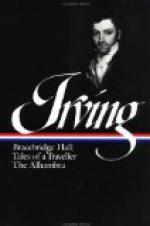[Illustration: Slingsby and Phoebe]
I have recently observed her holding long conferences in the churchyard, and up and down one of the lanes near the village, with Slingsby the schoolmaster. I at first thought the pedagogue might be touched with the tender malady so prevalent in these parts of late; but I did him injustice. Honest Slingsby, it seems, was a friend and crony of her late father, the parish clerk; and is on intimate terms with the Tibbets family. Prompted, therefore, by his good-will towards all parties, and secretly instigated, perhaps, by the managing dame Tibbets, he has undertaken to talk with Phoebe upon the subject. He gives her, however, but little encouragement. Slingsby has a formidable opinion of the aristocratical feeling of old Ready-Money, and thinks, if Phoebe were even to make the matter up with the son, she would find the father totally hostile to the match. The poor damsel, therefore, is reduced almost to despair; and Slingsby, who is too good-natured not to sympathise in her distress, has advised her to give up all thoughts of young Jack, and has promised as a substitute his learned coadjutor, the prodigal son. He has even, in the fulness of his heart, offered to give up the school-house to them, though it would leave him once more adrift in the wide world.
[Illustration: Butler with Bride Cup]
THE WEDDING.
No more, no more, much honour
aye betide
The lofty bridegroom, and
the lovely bride;
That all of their succeeding
days may say,
Each day appears like to a
wedding day.
BRAITHWAITE.
Notwithstanding the doubts and demurs of Lady Lillycraft, and all the grave objections that were conjured up against the month of May, yet the Wedding has at length happily taken place. It was celebrated at the village church in presence of a numerous company of relatives and friends, and many of the tenantry. The squire must needs have something of the old ceremonies observed on the occasion; so at the gate of the churchyard, several little girls of the village, dressed in white, were in readiness with baskets of flowers, which they strewed before the bride; and the butler bore before her the bride-cup, a great silver embossed bowl, one of the family reliques from the days of the hard drinkers. This was filled with rich wine, and decorated with a branch of rosemary, tied with gay ribands, according to ancient custom.
“Happy is the bride that the sun shines on,” says the old proverb; and it was as sunny and auspicious a morning as heart could wish. The bride looked uncommonly beautiful; but, in fact, what woman does not look interesting on her wedding-day? I know no sight more charming and touching than that of a young and timid bride, in her robes of virgin white, led up trembling to the altar. When I thus behold a lovely girl, in the tenderness of her years, forsaking the house of her fathers and the home of her childhood,




